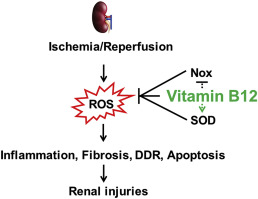Redox Biology ( IF 11.4 ) Pub Date : 2020-03-10 , DOI: 10.1016/j.redox.2020.101504 Feng Li 1 , Edward M Bahnson 2 , Jennifer Wilder 1 , Robin Siletzky 2 , John Hagaman 1 , Volker Nickekeit 3 , Sylvia Hiller 1 , Azraa Ayesha 1 , Lanfei Feng 4 , Jerrold S Levine 4 , Nobuyuki Takahashi 5 , Nobuyo Maeda-Smithies 1

|
Renal ischemia/reperfusion injury (IRI) is a leading cause of acute kidney injury (AKI), a potentially fatal syndrome characterized by a rapid decline in kidney function. Excess production of superoxide contributes to the injury. We hypothesized that oral administration of a high dose of vitamin B12 (B12 - cyanocobalamin), which possesses a superoxide scavenging function, would protect kidneys against IRI and provide a safe means of treatment. Following unilateral renal IR surgery, C57BL/6J wild type (WT) mice were administered B12 via drinking water at a dose of 50 mg/L. After 5 days of the treatment, plasma B12 levels increased by 1.2-1.5x, and kidney B12 levels increased by 7-8x. IRI mice treated with B12 showed near normal renal function and morphology. Further, IRI-induced changes in RNA and protein markers of inflammation, fibrosis, apoptosis, and DNA damage response (DDR) were significantly attenuated by at least 50% compared to those in untreated mice. Moreover, the presence of B12 at 0.3 μM in the culture medium of mouse proximal tubular cells subjected to 3 hr of hypoxia followed by 1 hr of reperfusion in vitro showed similar protective effects, including increased cell viability and decreased reactive oxygen species (ROS) level. We conclude that a high dose of B12 protects against perfusion injury both in vivo and in vitro without observable adverse effects in mice and suggest that B12 merits evaluation as a treatment for I/R-mediated AKI in humans.
中文翻译:

口服高剂量维生素B12可降低小鼠肾脏超氧化物和缺血/再灌注后的损伤。
肾缺血/再灌注损伤(IRI)是急性肾损伤(AKI)的主要原因,急性肾损伤是一种潜在的致命综合征,其特征是肾功能迅速下降。超氧化物的过量产生会造成伤害。我们假设口服具有超氧化物清除功能的高剂量维生素B12(B12-氰钴胺)可以保护肾脏免受IRI感染并提供安全的治疗手段。在单侧肾脏IR手术后,通过饮用水以50 mg / L的剂量对C57BL / 6J野生型(WT)小鼠进行B12给药。治疗5天后,血浆B12水平增加了1.2-1.5倍,肾脏B12水平增加了7-8倍。用B12处理的IRI小鼠显示出接近正常的肾功能和形态。此外,IRI诱导的炎症,纤维化,与未治疗的小鼠相比,细胞凋亡和DNA损伤反应(DDR)显着减弱了至少50%。此外,小鼠近端肾小管细胞的培养基中存在0.3μM的B12,缺氧3小时,然后再灌注1小时体外显示出相似的保护作用,包括增加细胞活力和降低活性氧(ROS)水平。我们得出的结论是,高剂量的B12可以在体内和体外保护小鼠免受灌注损伤,而在小鼠中却没有可观察到的不良影响,并建议将B12作为I / R介导的AKI在人类中的治疗方法值得评估。


























 京公网安备 11010802027423号
京公网安备 11010802027423号